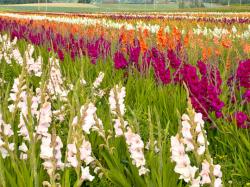Plant & Flower Growing In The US Industry Market Research Report
March 23, 2012 | 2 min to read

Los Angeles, CA – The Plant and Flower Growing industry has fared poorly in the past five years. The influx of cheap-cut flower imports from Colombia has had a staggering effect on domestic farmers, decreasing revenue at an average annual rate of 4.2% over the five years to 2012. IBISWorld expects revenue to total $13.5 billion by the end of 2012. Over the five years to 2012, the number of establishments is anticipated to fall to 45,565, reflecting a myriad of problems within the industry. According to IBISWorld industry analyst Nikoleta Panteva, the recession has tightened the purse strings of US consumers, and highly discretionary products, such as flowers and nursery plants, have suffered from decreased demand. Additionally, large retailers, such as Walmart and Safeway, have taken over a substantial portion of the retail market for flowers and nursery items. These stores have the power to set low prices, forcing growers' rates to drop. Improvements in transportation allow large farms, which can afford to ship cross-country, to be the main suppliers to buyers nationwide, since they offer better prices and variety than their smaller competitors.
As an agricultural industry, nursery and floriculture production has a low level of ownership concentration. Small family-run operations tend to dominate this industry. As such, there are no major players in the Plant and Flower Growing industry. While small businesses make up the greatest component of the industry, consolidation is resulting in rising numbers of large-scale producers. Competition and cost pressures are forcing smaller production farms to close as the industry moves toward large-scale production. A possible outcome of higher concentration will be greater profitability among large farms as fixed costs fall relative to production, says Panteva.
In 2012, IBISWorld expects the industry to continue declining, with revenue decreasing 3.9% from 2011. While the overall US economy is no longer in a recession, weak discretionary spending will continue to put a strain on flower sales throughout the year. Government support programs will likely pass over this farming industry, since flowers and nursery plants are discretionary goods unlike food. Furthermore, cheap imports allow Americans to purchase flowers at a low price, causing demand for domestic products to diminish even more. Through 2017, IBISWorld forecasts that revenue will continue to decline. Duty-free imports will continue to infiltrate the market, while the domestic industry struggles to remain on the map through intense price competition. Genetically modified plant seeds may be the lifesaver this industry needs; however, current opposition to the movement leaves their future uncertain. For more information, visit IBISWorld’s Plant and Flower Growing report in the US industry page.
To read the rest of the story, please go to: IBISWorld
